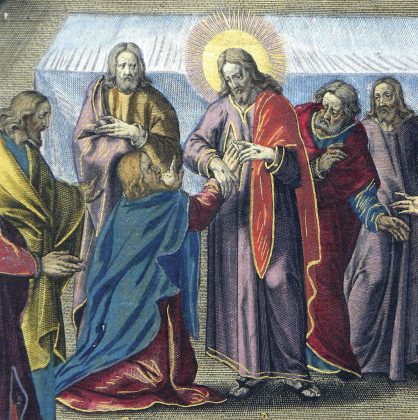Feast of St. Thomas, Apostle
St. Thomas, Apostle. When the disciples announced to him the Resurrection of Jesus, he did not believe, but when Our Lord showed to him His wounds and let him touch them, St. Thomas exclaimed: “My Lord and my God!”, thus repairing his scepticism with this categorical declaration of Christ’s divinity. He evangelized in India, where his commemoration is a liturgical solemnity.
See also:
Mass Readings
First Reading – Eph 2:19-22
Brothers and sisters: You are no longer strangers and sojourners, but you are fellow citizens with the holy ones and members of the household of God, built upon the foundation of the Apostles and prophets, with Christ Jesus himself as the capstone. Through Him the whole structure is held together and grows into a temple sacred in the Lord; in Him you also are being built together into a dwelling place of God in the Spirit.
Responsorial Psalm – Ps 117:1bc, 2 (R. Mark 16:15)
R. Go out to all the world and tell the Good News.
Praise the LORD, all you nations;
glorify him, all you peoples! R.
For steadfast is his kindness for us,
and the fidelity of the LORD endures forever. R.
Gospel – Jn 20:24-29
Thomas, called Didymus, one of the Twelve, was not with them when Jesus came. So the other disciples said to him, “We have seen the Lord.” But Thomas said to them, “Unless I see the mark of the nails in His hands and put my finger into the nailmarks and put my hand into His side, I will not believe.” Now a week later His disciples were again inside and Thomas was with them. Jesus came, although the doors were locked, and stood in their midst and said, “Peace be with you.” Then He said to Thomas, “Put your finger here and see My hands, and bring your hand and put it into My side, and do not be unbelieving, but believe.” Thomas answered and said to Him, “My Lord and my God!” Jesus said to him, “Have you come to believe because you have seen Me? Blessed are those who have not seen and have believed.”
Featured Saints
St. Germanus of the Isle of Man, bishop (c. 474). He was a nephew of Saint Patrick, by whom he was ordained, and became a missionary monk who laboured to spread the Gospel beyond the bounds of Ireland to Wales and Brittany, and was eventually sent to the Isle of Man as bishop.
St. Leo II, Pope (†683). Well versed in Greek and Latin, a friend of poverty and the poor, he confirmed the decrees of the Third Council of Constantinople and affirmed Papal supremacy in face of repeated attempts by the Patriarchs of Constantinople to establish independence from Rome.
St. Heliodorus, bishop (†fourth-fifth century). Disciple of St. Valerianus of Aquileia, he participated in the Council of Aquileia in 381, against the Arian heresy.
St. Anatolius, bishop (†458). Patriarch of Constantinople, defender of the dogma of the divine and human natures in Christ during the Council of Chalcedon.
St. Philip Phan Van Minh, priest and martyr (†1853). He gave himself up to death fearing for the safety of the family that sheltered him during persecution. He was beheaded in Cochinchina, in present-day Vietnam, by order of King Tu Ðuc.
St. Joseph Nguyên Ðình Uyên, martyr (†1838). Lay Dominican tertiary and catechist who was imprisoned and barbarously tortured in Hung Yên, Vietnam, for refusing to trample on a cross.
St. Raymond Gayrard, layman (†1118). Upon becoming a widower, he dedicated himself to works of charity, founded a hospital and was admitted as a canon of St. Sernin Church in Toulouse, France
Blessed Mary Ann Mogás Fontcuberta, virgin (†1886). Founded the Congregation of the Franciscan Missionary Sisters of the Mother of the Divine Shepherd in Fuencarral, Spain.







